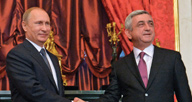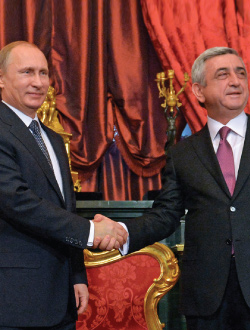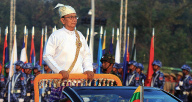Whither Armenia and the Customs Union?

 A century after the Armenian genocide, and a quarter century post-independence, Armenia pivots to Moscow
A century after the Armenian genocide, and a quarter century post-independence, Armenia pivots to Moscow
Why is Armenia joining the Eurasian Customs Union, and not the EU? Is Yerevan’s decision driven primarily by security considerations? Or are security issues simply a pretext for the government in Yerevan to manipulate nationalist moods in the country in order to stay in power? Or perhaps both?
After September 3rd, 2013, when Armenian President Serzh Sargsyan announced Armenia’s U-turn away from signing the Association Agreement with the EU in favour of joining the Eurasian Customs Union (whose members also include Russia, Belarus, Kazakhstan and Kyrgyzstan), security issues have been front and centre in most explanations of Yerevan’s behaviour. These security issues relate fundamentally to Russia’s role in the former Soviet space and particularly in Armenia, where Russia enjoys a military base and where Russian forces are, by mutual agreement between Moscow and Yerevan, responsible for security along the Armenian-Turkish border.
Of course, Armenia’s current strategic and political realities are directly connected to the last century of its history. To this very day, Armenia remains highly exercised by the Armenian genocide of 1915 and the imperative of securing Armenians against any aggression by the country’s closest neighbours. The genocide has been recognized by 21 states and a host of international organizations, including the UN General Assembly and the European Parliament. However, for a variety of reasons, Armenia’s immediate neighbours – Georgia, Turkey, Azerbaijan and Iran – have not recognized the genocide. As the centenary of the genocide approaches, discourses and debates around it intensify – both by dint of government strategy and through nationalist groups. These discourses and debates are commonly rooted in a distrust of Turkey, including as evidenced by the recently signed and failed protocols on the normalization of Turkish-Armenian relations, as well as by the role of Turkey in Syria and Iraq – as perceived by Armenia, at least. Armenia believes that Turkey is supporting ISIS, and that Turkey constitutes not only a threat to Armenians in ISIS-occupied lands but ultimately to Armenia itself. It follows that there are today only a few NGOs and individuals in Armenia who still think that normalization of relations with Turkey and the opening of the border between the two countries are serious possibilities in the near future.
Another major Armenian security concern relates to the frozen Nagorno-Karabakh conflict. Since the ceasefire agreement of 1994, the OSCE Minsk Group, which includes the US, Russia and France, has been mediating between Yerevan and Baku without any essential or decisive success. Sniper shootings and small attacks continue to this day, resulting in a small but regular stream of casualties on both sides. Tensions in the theatre remain high. Last August, for instance, saw fighting in Nagorno-Karabakh that was the most significant escalation of the conflict since the ceasefire, causing many analysts to predict that ‘hot’ war would recommence. The presidents of Armenia and Azerbaijan met with Russian president Vladimir Putin immediately after this fighting, which led to at least a temporary, albeit precarious calm in the theatre.
Islam has also figured prominently in the discourses around Armenia’s security, given the country’s history of hostile relations with its neighbours to the east and west alike. Mujahideen and Wahhabi fighters, including the late Chechen militant Shamil Basayev, fought on the Azerbaijani side in Nagorno-Karabakh. If during the 1915 genocide conversion to Islam was the only means for Armenians to escape being killed, then in the Nagorno-Karabakh conflict the Islamic factor played a role – even if for a limited time – in mobilizing fundamentalist forces against Armenians. More recently, the destruction by ISIS last fall, in Deir ez-Zor, Syria, of the Armenian Genocide Martyrs’ Memorial Church – a place of pilgrimage for many Armenians, especially on April 24th, the day of remembrance for victims of the genocide – reverberated across Armenia. The church was blown up on September 21st – peculiarly, the highly symbolic date of Armenia’s declaration of independence from the former Soviet Union.
To be sure, Yerevan’s decision to accede to the Eurasian Customs Union (an accession that was formalized at the start of this year) was made in the context of the significant pressure – some perhaps explicit, but much of it obvious and implicit – brought to bear on Armenia by its chief strategic partner, Russia. This pressure had several dimensions. First, Russia is one of the basic providers of weapons for both Armenia and its biggest enemy, Azerbaijan. Second, Moscow’s ferocious reaction to the revolution in Ukraine in the aftermath of Viktor Yanukovych’s decision to delay the signature of an Association Agreement with the EU was clearly noted across the post-Soviet space. Third, there is the aforementioned brute fact of the Russian military base in Armenia and the presence of Russian troops on the Armenian-Turkish border. Fourth, Armenia is highly dependent on, and integrated with, Russia economically on the strength of a number of key companies in the energy and communications sectors that are owned by Russian companies. Taken together, these four dimensions simply do not allow the Armenian government to be meaningfully independent in its decision-making in respect of integration into the EU, or indeed into any species of Western union or alliance.
More ominously, the security issue in Armenia turns on the less-than-democratic processes dominating the country’s politics. The ongoing falsification of elections, non-independent courts – de facto appendages of the government (itself corrupt) – and, to be sure, the selective application of laws, together make the country vulnerable to internal and external threats. Moscow and Western capitals alike continue to support corrupt Armenian governments because they are, arguably, easy to pressurize and manipulate in the service of the goals of their sponsors. The principal difference, however, is that Russia has far greater and more direct hard power to press the Armenian government than do Western countries (which may be more disposed to the use of various types of soft power). Bref, the physical presence of Russian troops trumps any internal processes – democratic and non-democratic alike – in terms of relevance for the security of the country and its people.
To date, the basic governmental justification for Armenia’s security arrangements is the claim that only Russia, and not the West, proposed for Armenia an effective security system – namely the Collective Security Treaty Organization (CSTO) – which took into account the country’s complicated geopolitics. In reality, this is a nationalistic myth deployed by the government to preserve its power and authority. The myth is belied by the fact that Russia exports weapons to both Armenia and Azerbaijan. Moreover, Russia considers Turkey an indispensable economic partner for the transfer of oil and gas to Europe.
The reality is that successive Armenian governments have, for the last two decades, failed to solve the Nagorno-Karabakh impasse, implement critical democratic reforms, diversify the economy, establish independent courts, and eliminate the post-Soviet oligarchical system. This shows that the failure of the EU in Armenia and the U-turn of Armenia in 2013 were not only the result of corrupt government but also of a deficiency of trust by Yerevan in Europe’s political class and its institutions as legitimate and credible sources of democratic reforms that could make Yerevan more independent in its decision-making. On the contrary, Yerevan has confirmed and consolidated the decision-making cage in which it finds itself, and cannot seem to see beyond it.
The majority of Armenians seem to think that joining the Eurasian Customs Union is mostly a formal, if not symbolic, step that simply serves to solidify the status of Moscow as Yerevan’s senior strategic partner. Many political analysts and intellectuals, however, are convinced that Armenia will not only lose considerable decision-making autonomy as a result of the Union, but will get precious little in return in economic or political terms, even while assuring its security. These same commentators are convinced that the Union is unsustainable over the long run, and that Yerevan would be better served by signing an association agreement with the EU. Young Armenians, for their part, are divided over Yerevan’s strong pivot to Moscow: highly educated young Armenians think that the Eurasian Customs Union will mostly harm Armenia and hinder its development and integration into the European family. Other young people – particularly those who go to Russia for seasonal work and otherwise depend on Russia economically – believe that joining the Union was the only possible decision for Yerevan, as Armenia (population three million) cannot credibly oppose Russian preferences on most major questions of state and strategy.
Hovhannes Hovhannisyan is Associate Professor of Humanities and Social Sciences at Yerevan State University.











